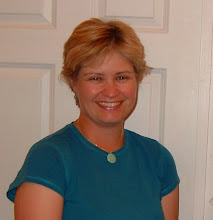Every family has a time of year when everybody's birthday seems to happen. For us it's the period at the end of May and beginning of June. This always used to be a bit of a bummer for me with my own birthday on 1st June because every year it collided with the start of school exams, 'O' levels, 'A' levels and then university tripos exams and finals.
The day of my 18th was the day before my 'A' levels started, but I abandoned all my revision on that day to be whisked off to Alton Towers to enjoy all the rides practically to myself. There was something deliciously naughty about it, and typical of how intense my birthdays have been over the years, sometimes going on for days, despite the awkward timing.
I can see my daughter developing a similarly excitable attitude towards her birthday. Like mother, like daughter. She turned five on 23rd May, which was also her last day of term at school and the day of her party at our house. The countdown to it was almost unbearable for her. "How many sleeps til I'm five?" has been her repeated mantra since at the least the beginning of April, so it has been a constant challenge to my mental arithmetic capability, which isn't good at the best of times.
We have always held our children's parties at our house, doing the usual party tea and games, eschewing the popular trend for hiring out village halls and children's entertainers. Pass the parcel, musical statues, musical bumps and "duck, duck, goose" were my daughter's games of choice this year.
During the party preparations I almost decided against wrapping the pass the parcel prize in the same number of wrappings plus one as there were children coming to the party. I almost decided against putting a lollipop inside each layer, a practise supposed to make passing the parcel as democratic and fair and politically correct as possible. But I didn't decide against these things - bowing instead to the weight of contemporary expectation that every child should win something just for taking part. So I dutifully put seventeen wrappers, including sixteen mini chupa-chups, around the prize.
What a load of rubbish! First of all, as usual, three or four kids didn't want to play in the first place - depsite (or maybe precisley because of) the predictable promise of a sweetie each time a layer came off. Then came growing disillusion and boredom with every rotation of the parcel around the increasingly restless circle of remaining children.
Where's this aversion to allowing kids the anticipation of winning by chance come from? Why are we so scared that kids might not be able to handle losing? It's clear that the possibility of losing is part of the game, and makes the idea of actually winning all the more exciting. If everyone wins a small prize anyway just for taking part then the kids start settling for less and disengage from the possibility of winning the bigger prize. Is there a more precise demonstration of how to encourage people to tolerate mediocrity?
The kids get bored and drift off, having quickly sussed, and quite rightly dismissed, the patronising strategy which we adults have come up with only because we're terrified of having to deal with a losing child's tantrums. In fact, kids who lose under normal circumstances don't have a tantrum, they just shrug and get on with something else, quite accepting of the fact that losing occasionally is as much part of the game as winning.
So next time you're wrapping a pass the parcel prize, resist the temptation to include consolation prizes and then tie yourself in knots trying to keep track of which child's already unwrapped and who hasn't unwrapped yet. Put on only a few layers of wrapping, avert your eyes from the group completely and press the pause button totally at random. Kids are not stupid, they are really quite resilient,they really can handle it, and it won't drive you quite so mad.
Ruby Wedding Cake - the Winner!
13 years ago





